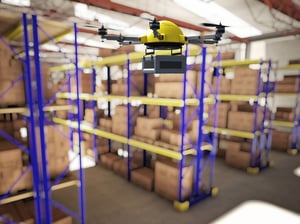In this special blog series, we will review the disruptive technologies being introducing by today’s forward-thinking manufacturers. Over the next few weeks, you’ll learn about the cutting-edge tools transforming the industry and the ways ERP can support their implementation.
Drones, also known as unmanned aircraft systems (UASs), have been used for many years for military applications, but in recent years, drones guided by remote control or computers have found new purpose in commercial industries. In fact, Goldman Sachs sees businesses and civic governments as the fastest growth area for drones and expects these new applications to push the drone market size to over $100 billion by 2020.
How are manufacturers making use of this industry-shaping technology? Let’s walk through some of the ways UASs are increasing productivity — and in some cases quality — for American manufacturers.
Production
Today’s manufacturers have begun using drones for production in as early as the sourcing phase, when they can be used for mining, prospecting and obtaining raw materials. From there, drones have found new purpose in the factory, from materials handling to transporting products. Drone technology can be especially beneficial in facilities that present precarious conditions for workers. Rather than sending a worker through a maze of complex and potentially dangerous machinery to retrieve the parts needed, a drone can be ordered to fetch a part from the depot and deliver it safely to the  production floor in a fraction of the time.
production floor in a fraction of the time.
In addition to applications that increase productivity, drones can support plant security and safety. UASs equipped with cameras can be programmed to monitor facilities as a security guard might, by “walking the perimeter” and capturing footage that would not typically be caught by stationary security cameras. Likewise, drones can be used to perform safety inspections or, when outfitted properly, to perform maintenance operations or repairs. Some specialized manufacturers employ drones to perform tasks that would be unsafe for humans, such as mixing chemicals. Depending on the unique needs of the manufacturer, integrating drones into production can bolster productivity, protect worker safety and support facility security.
Warehousing & Delivery
Drones are giving manufacturers a leg up on inventory management as well. Utilizing items tagged with radiofrequency identification (RFID) tags, Walmart has begun employing drones to track inventory within their warehouses. Sometimes used in lieu of forklifts and conveyors, drones can transport items quickly within a distribution center or between a production facility and distribution center, which can also simplify and expedite order fulfillment.
On the tail-end of the supply chain, drones have the potential to transform how goods are delivered to consumers. Companies like FedEx and UPS stand to benefit from drones, which can be used to monitor traffic and optimize routes. Drones may also be a gamechanger as a delivery method, especially in rural areas where destinations are often spread out and expensive to service. In fact, UPS teamed up with drone maker CyPhy Works (now Aria Insights) to successfully deliver an asthma inhaler to an island three miles off the Massachusetts coast – demonstrating just how critical drones can be for remote customers.
Conclusion
In the manufacturing industry, integrating new technologies such as drones can create new efficiencies and significantly improve margins. However, this value can only be realized in combination with a software system that allows business leaders to put the intel collected to good use. Inventory counts, camera footage and inspection results are most beneficial to your business when fed into a modern ERP system that can pair raw data with advanced analytics. The result? Actionable insights that can help your productivity reach new heights.
Curious about other tech trends in Manufacturing?
Download our e-book, “Disruptive Manufacturing: 3 Technologies That Will Transform You Operations,” to learn about leading-edge technologies and features emerging in the world of ERP.
Choosing an ERP Consultant
One-size-fits-all is not an option when it comes to ERP systems. The Copley Consulting Group knows there are several factors to determine the right fit for your organization. When working to implement your ERP solution, Copley can provide the technology and support needed for your specific industry and business when choosing between cloud-based or an on-premise ERP. To discuss the right ERP system for your organization, complete our contact form, call us at 855-884-5305, or email us at info@copleycg.com.

